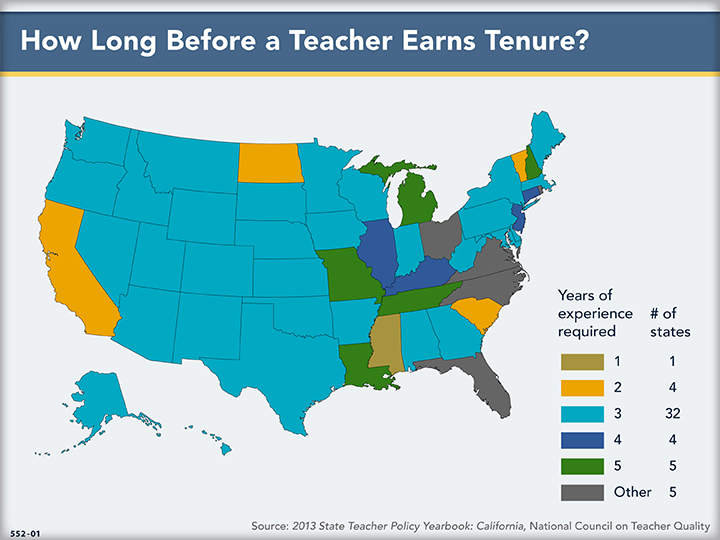Teacher tenure is a controversial topic. The practice started as a way to protect students from teacher turnover related to political changes and has been a political touchpoint ever since. Here’s everything you need to know about this policy that impacts teachers across the country.
What is teacher tenure?
At the core, teacher tenure is job protection. Tenure laws prevent teachers from being fired without a good reason. Once a teacher has tenure, their job is more secure and they won’t have yearly contracts. So, teachers who have tenure cannot be fired or not-renewed for things like using curriculum materials that some parents don’t approve of or being involved in political activities. And if they are terminated, the district follows a formal due-process procedure that lets the teacher have input.
Teacher tenure is not available to all teachers—four states (Florida, Kansas, North Carolina, and Wisconsin) do not have tenure at all. And in schools that do have tenure, the policy is limited to teachers who have met certain criteria, like working for a certain number of years.
In this video from the American Federation of Teachers, one teacher explains tenure and her thoughts on the policy.
What is the history of teacher tenure?
Teacher tenure started in New Jersey in 1909. It came out of the progressive movement that aimed to improve government. It was created to ensure that teachers stayed in the profession and were not replaced by politicians who wanted teachers that agreed with them when they took office. Tenure was also put in place to protect teachers from political blowback, for example, so they could not be fired for participating in a political demonstration that was in opposition to the party in power. Finally, tenure was put in place to protect teachers who taught things that people disagreed with, especially after the Scopes trial in the 1920s.
Since then, teacher tenure has protected teachers from racial and sexual discrimination and, in a job that has been traditionally female, has helped protect teachers’ jobs after they get married. For example, during the Great Depression, teachers who were in states with teacher tenure laws were not able to be fired because they were married. And when schools were desegregating in the 1960s, tenure laws protected Black teachers who taught in schools that were desegregating from being fired and replaced with white teachers.
Tenure has always been controversial. In 2009, states started to change tenure laws, partially in response to the Great Recession and as a way to save money on education, and also because federal laws (NCLB, Race to the Top) were requiring states to adapt evaluation and compensation plans, which led some states to reevaluate tenure.
Court cases about teacher tenure
Recently, court cases have struck down teacher tenure and seniority laws. Eighteen states have weakened tenure laws. Florida and North Carolina have tried to eliminate tenure. This is in response to more of a focus on performance measures, the argument being that performance metrics should be the primary factor in deciding if teachers continue in their jobs, not tenure.
State legislators can change laws that lay out contract, evaluation, and collective bargaining rules, as long as any new law honors the rights that tenured teachers had before the legislation changed. States cannot change the rights of teachers that were tenured before any laws changed.
In June 2014, a ruling in the Vergara v. State of California case found that California’s teacher tenure laws had deprived students of equal protection under the state and federal constitutions. At the heart of this lawsuit was the idea that because the process to dismiss ineffective teachers was so arduous, ineffective teachers remained in the classroom, and students did not receive a proper education. This was the most recent court case that addressed teacher tenure.
This video from CNN explains the reaction to the Vergara v. California case.
How do teachers get tenure?
Each state that has tenure laws has a different process that teachers go through to become tenured. And a teacher’s tenure in one district does not necessarily transfer to another district.

To get tenure, typically teachers work for a few years (usually three) without tenure. During this time, the teacher can be dismissed for cause or denied a new contract. Each state has different protocols and processes that teachers move through to obtain tenure. Fewer than half of U.S. states require districts to consider teacher performance when deciding tenure. Twenty-two states mandate that teachers meet a performance requirement to earn tenure. Only eight states (Delaware, Idaho, Louisiana, Maryland, Michigan, New Jersey, New Mexico, and Pennsylvania) require evidence of successful teaching to move from probation to professional license.
Read more: National Center on Teacher Quality
What does it mean to have tenure?

After a teacher has tenure, they are covered under their state’s laws that ensure they cannot be fired for arbitrary reasons. If a principal does want to fire a tenured teacher, they must go through “due process,” which explains the reason for dismissal and gives the teacher an opportunity to challenge the decision if the teacher believes the decision is not substantiated.
Tenure also protects teachers against being fired because of their political leanings, earning a higher salary, the people they associate with, or years of experience. Under the existing labor laws, teachers who are “at will” employees can be fired for those reasons, but with tenure, teachers can only be fired for “just cause.”
Read more: Teachers who have had classroom materials questioned share what happened and how they responded.
What are the limits to tenure?
Just because a teacher has tenure does not mean they cannot be dismissed. Each state outlines the reasons that tenured teachers can be dismissed, including:
- Incompetence
- Insubordination
- Neglecting their duties
- Immoral behavior
- Violation of school board rules
- Unprofessional behavior
- Committing a crime
- Workforce reductions due to economics or enrollment
Many states also identify “any good and just cause” as a reason to fire a tenured teacher. The difference is in the process. Rather than a principal simply dismissing or not renewing a teacher, with tenure the teacher must receive notice and have a hearing to appeal if they wish.
What is due process?
Due process is the legal process that a teacher goes through if they are dismissed and want to appeal that decision. It involves a hearing by the board of education, an independent officer, or an administrative law judge or arbitrator. In most states, if a teacher is dismissed, they can appeal the decision before the court. Each state has a distinct time period for due process and appeal.
What is the debate about teacher tenure?
Tenure is always a topic of debate among politicians and state legislatures.
Arguments against teacher tenure
- Now that we have Civil Rights and Civil Service laws to protect against discrimination, tenure is no longer necessary.
- Tenure may prevent ineffective teachers from being fired, which has a negative impact on students.
- Teacher tenure may create complacency as teachers do not have an incentive to improve if they believe they cannot lose their jobs.
Arguments for teacher tenure
Proponents of teacher tenure argue:
- The current Civil Rights and Civil Service laws are not sufficient and do not cover all the parameters that tenure laws do, so teachers are more protected under tenure laws.
- Because teachers must answer to principals, districts, parents, and other stakeholders, tenure helps teachers protect their jobs. For example, a teacher who teaches evolution needs protection if parents in a fundamentalist community oppose the curriculum.
- Tenure allows teachers to be involved in school decisions without being afraid of backlash.
- The actual number of teachers who should not be in the classroom but are not fired because of tenure is small.
- Tenure attracts people to teaching, a job that is already low-paying. Having job stability may keep teachers in the profession and reduce turnover. Conversely, not having tenure may increase teacher attrition and turnover.
- When tenure is connected to teacher performance, students tend to perform better.
Read more: 11 School Districts That Pay Teachers Six Figures
What do teachers think of tenure?
In the video above, teacher Tom Rademacher explores what he thinks the discussion about tenure should be: keeping and supporting young teachers rather than focusing on dismissing tenured teachers.
In a 2015 Teach Plus survey of 506 public school teachers by the Goodwin Simon Strategic Research group, teachers valued tenure but also supported reforms. From the survey:
- 81% said tenure was personally important to them.
- 55% worked at schools where tenure had prevented an effective teacher from being fired.
- 69% said they knew of a teacher who should have been dismissed but wasn’t because of tenure.
- 15% said that tenure in two years or less was appropriate.
- 71% said that layoff decisions should consider classroom performance.
- 75% said that teachers should play some role in tenure decisions.
- 75% said that observation data should be part of tenure decisions.
What do you think about teacher tenure? Come share in our We Are Teachers HELPLINE group on Facebook.
For more articles like this, sign up for our free newsletters to find out when they’re posted.


